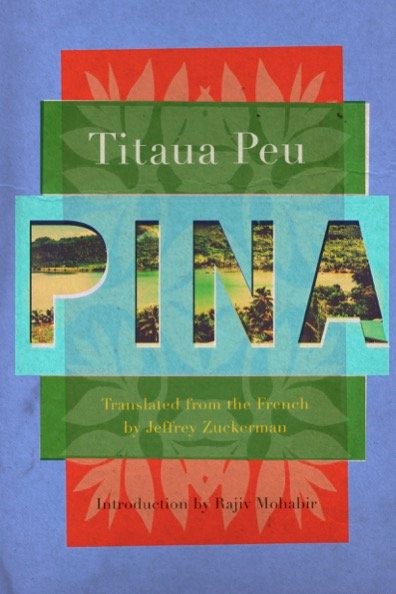
[Restless Books; 2022]
Tr. from the French by Jeffrey Zuckerman
Published in France in 2016 and newly translated into English by Jeffrey Zuckerman, this Tahitian novel lives in smells: of jasmine, beer, dirty diapers, exhaust fumes, blood, semen, sweat, and the Marseilles soap that the eight-year-old heroine uses to wash all these stains off her family’s laundry in the river. Pina is, as the narrator frequently puts it, no Cinderella. “Pina’s shame was red-hot and if she could have destroyed the entire earth, she would have.”
With its sprawling cast of characters, Titaua Peu’s novel is a red-hot kaleidoscope of native Tahitian affect in the 2010s, as the French government and international bodies continued to thwart this Pacific nation’s self-governance. By its end, this novel becomes a crime thriller, as Pina’s father burns to “somehow empty out the sea with nothing but a whiskey glass.” His mobilization against colonial violence, driven in equal measure by ideals of Maori masculinity and heteropatriarchal tenets of Christianity, is yet another attack on Tahitian bodies.
Titaua Peu is a brilliant writer of bodily encounters. She writes of pleasure and violence, but mostly of the slide between the two. Peu’s characters desire paternalistic French men who call them things like “island princess.” Ma, Pina’s mother, continues desiring her husband Auguste, who regularly beats and rapes her; their one harmonious encounter, in a chapter called “Love Scene,” is unexpectedly soft. In its complex imbrication of queerness and heteropatriarchy, indigenous critique and colonial discourse, Pina stages the bizarre and beautiful workings of desire. The novel reanimates Cathy Cohen’s vision of queerness as the domain of deviant heterosexual, cisgender people of color, so that Rosa, Pina’s older sister who does sex work, appears as a more apt carrier of queerness than François, the gay French archaeologist who takes up with Pina’s older brother, Pauro.
Above all, Peu allows her characters full expression of their desires. It’s this gift for polyphony—even among staggering power differentials—that brings Pina to life. In a scene where Auguste rapes Ma, the narration slides between their subjectivities without warning. This type of simultaneity, weighing the abuser and victim equally in narrative representation, is perhaps controversial. Yet—despite what the novel’s title promises—Peu foregoes absolute identification with her least powerful characters. The angry patriarch is at the center of this novel.
Precisely because of its polyphony, Pina is an exciting addition to the radical canon of domestic violence literature. By this I mean those texts that take on the problem of representing this “everyday” rather than “eventful” sort of violence, which in literature as in general discourse has been difficult to separate from notions of “love,” “passion,” and “discipline.” For the women in Auguste’s house, abuse is a part of the landscape, an elemental force, like the wind. In Peu’s writing, this terror seems to belong to the household rather than to Auguste alone. Pina paints domestic violence as something that happens a “dynamic network of relationships,” as historian Dipesh Chakrabarty has put it, one “that cannot be contained within the figure of a single victim.” With her title in particular, Peu challenges readers to reimagine the workings of violence—and of the novel form. Writing for Asymptote, Kiran Bhat suggests that, in titling her book “Pina,” Peu placates her Francophone audience’s desire for a traditional Bildungsroman about one character, while in fact offering a polyphonic novel about a collective. Her trick, I believe, goes deeper: Despite naming the book after a girl who is abused, Peu does not lend all her authorial attention to a single victim, or even to the category of victim. By the novel’s end, readers may be hard-pressed to label any character as pure victim or pure abuser. In and through her abusive characters, Peu challenges the carceral white feminist imperative to condemn and punish male abusers. By insisting on placing abusers within hierarchies of settler colonialism and racial capitalism, Peu joins the ranks of radical writers of domestic violence, such as Gayl Jones, Alice Walker, and Carmen Maria Machado.
All this is more than enough to recommend the novel. But what the press around Pina hasn’t mentioned, and what surprised me when I read it, is how funny it is. Pina’s older sister Hannah drags the French men who hit on her in Parisian tiki bars. Pina recognizes the absurdity of her position with the frank and funny voice that could only belong to an eight-year-old. Titaua Peu has been compared to—in fact, herself invokes the name of—Toni Morrison. These writers do, indeed, share a smirking narrative voice. But, like Morrison and perhaps even more so like the contemporary Mexican writer Fernanda Melchior, Peu’s humor by no means dampens her anger. Together, humor and anger merge like hot water and wind into a sinister twirling, a momentum that carries the reader. The novel’s final “trick” performs for the narrative what the author often achieves on the sentence level: a winking reversal of colonial expectations.

If Peu is playing tricks on Francophone readers and, now, Anglophone ones, then why is no one laughing? A cursory look at French reviews on Goodreads reveals an obsession with the novel’s “darkness.” Apparently, it’s a “noir” work of “noirissime” with a “noirceur terrible.” Restless Books introduces Pina in English as “a gut punch of a novel,” the “devastating” story of a family “on a path to destruction,” and many English-language reviews on Goodreads limit themselves to trigger warnings and mentions of trauma. This sober readerly disposition is perhaps best represented by the two covers of the French edition, one with a black background and what appears to be a Tahitian design in light gray, and the latest with a child’s black silhouette against yellow. The new edition by Restless Books, a press for immigrant voices and writers in translation, features a bright cover with the postcard-perfect images of Tahiti that the novel so directly undermines. These covers—as covers always do—remind me of the basic pleasure of books. In the case of Pina, what does it mean to read and take pleasure from a novel about economies of enjoyment, and about the violence done in the name of settler pleasure? A novel that is also, equally, about queer Tahitian pleasure, including Peu’s creative act itself?
For me, the tongue-in-cheek vivacity of the American edition’s cover suggests the power of translation and republication to propose new modes of reading—in this case, an alternative to the asceticism of the French edition. Perhaps these two covers present a visual catalogue of colonial reading practices: from shame to pleasure and back again. Or, perhaps, more than anything, the covers suggest Peu’s chameleonic power, her ability to provoke multichromatic readerly affect. Read Pina. Then, see how you feel, and wonder why.
Fiona Bell is a translator and cultural critic living in New Haven, Connecticut. Learn more about her work at fiona-bell.com or follow her on Twitter at @fiona_ina_bell.
This post may contain affiliate links.







